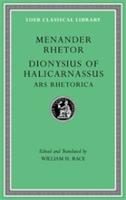
Loeb Library (2019) h/b 462p £19.95 (ISBN 9780674997226)
R. provides separate Introductions to MR and [DH], with, for MR, notes on the author (who may have hailed from Laodicea), the dates of the treatises, their (physical) condition and relationship, the rhetorical and cultural context (where R. points out MR’s ‘drawing on the long Greek poetic tradition’—he lists Homer, Hesiod, Sappho, Alcaeus, Anacreon, Parmenides, Empedocles and Bacchylides; there are ‘affinities’ with Pindar and Theocritus), the addressee (not known) and the implied audience, the manuscripts and a list of editions, collections of emendations and other references. It is possible, but far from certain, that the second of the two treatises here attributed to MR may not have been written by him. R. relies on the text of Russell and Wilson (1981), as he does for [DH]. For [DH], R. mentions his frequent citation of Plato, considers the identity of the addressee Echecrates (possibly borrowed from the Phaedo), and again lists the manuscripts, editions and some references.
The three treatises, in a workmanlike translation accurately reflecting the texts, are unlikely to result in long queues in bookshops. All are ‘protreptic’—i.e. they purport to give advice to budding rhetors: if you want to praise a city, or a harbour, to compose a philosophical hymn or a fictive one, to address an emperor or celebrate a birthday, or [DH] to compose an epithalamium or exhort athletes, here is the guidance you seek, sadly banal though it is: e.g. do not harp on an emperor’s bad points, or, in the perhaps unlikely event that you have to praise a harbour, emphasise that, if natural, it does not silt up, or if man-made, that it came into existence because of the city. R. makes the point that many of MR’s pieces of advice about, say, praising cities would be of equal relevance today: just so!
‘Richly informed by the prose and poetry of a venerable past’, says the blurb writer, adding that these works ‘provide a window into the literary culture, educational values and practices of Greeks’ under Roman rule at that time: in other words, ample fare for someone studying the so-called Second Sophistic, but assuredly not to be read for pleasure.
Two useful appendixes list passages quoted or adapted, or allusions to known passages, separately for MR and [DH]. Homer is easily the most popular. A mild curiosity is the extreme sparseness of references to the Attic dramatists.
Colin Leach
